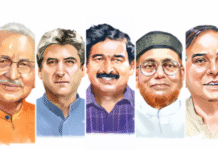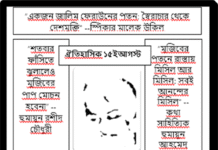Foundational fissures lead to democratic fragility in Bangladesh
This conflicting history and competing narratives are primary reasons for the insecurity of Sheikh Hasina. During each term in office, she has increased her power and defanged the opposition and the institutions that could otherwise have kept a check on her actions, writes Rishija Singh for South Asia Monitor
OCT 19, 2019
South Asia Monitor

In Bangladesh, the recent killing of a second-year engineering student, Abrar Fahad, has shocked the nation and brought existing levels of intolerance in the country into the spotlight. The victim was beaten to death in Dhaka, on the campus of the Bangladesh University of Engineering and Technology, allegedly by students of the Chhatra League, the student wing of the ruling Awami League. His crime was that he wrote a Facebook post criticizing the unilateral nature of a bilateral agreement Prime Minister Sheikh Hasina signed with India during her recent visit to New Delhi.
With its economy bettering India’s and by hosting of millions of Rohingya refugees, Bangladesh manages to elude international criticism. However, these sporadic incidents of violence highlight the condition of democracy in the country. The most striking thing that has accompanied Abrar’s killing and subsequent protests is the conspicuous absence of opposition political parties from it. There is, however, nothing new about this absence, as the huge road safety agitation and the quota movement last year did not see any leadership at all from the Opposition. Both the 2018 movements were completely led by students from schools and universities. Irrespective of the violence, the government had to succumb to the students’ demands in the end.
The history of Bangladesh is witness to the tenacity and vibrancy of its student community. Sheikh Mujibur Rahman himself started as a student leader. Later, the language movement and ‘eleven-points’ movement under the repressive Pakistani regime were largely led by students who have always been active participants in the politics of Bangladesh, either by choice or circumstance.
However, the present protest seeks “abolition of politics” from campuses as one of the many demands. The current demand should be seen in the light of growing violence in the campuses and the streets of Bangladesh, accompanied by the ever-increasing intolerance toward any kind of opposition or criticism. The ruling regime, led by Sheikh Hasina, won elections in December for the third consecutive term, amid allegations of poll rigging and election-related violence. The victory saw complete decimation of the Opposition from politics. The Opposition appears to lack the imagination as well as fresh narratives to be able to provide a meaningful alternative to the people. The boycott of the 2014 election by the opposition alliance that included the main opposition Bangladesh Nationalist Party, led by Khaleda Zia, proved to be a suicidal move, one that threw them into an abyss from where recovery seems very difficult. It threw the organizational structure of the parties into the quagmire while simultaneously distancing them from the ground realities. The last election and events that preceded it marked a new low for the Opposition.
This is not Bangladesh’s first stint with the struggle for democracy. The roots of the current problem can be traced back to the Liberation War of 1971. The ruling regime has never refrained from using the ghost of the war to gain political mileage for itself. Bangladesh has never settled on its “Father of the Nation”. While the Awami League traces the struggle for liberation from the language movement of 1952, the BNP traces it from the day the “War of Independence” was announced by General Zia-ur-Rahman, former president and husband of Khaleda Zia.
This foundational dispute proved fatal for Sheikh Mujib when, barely three years after ruling Bangladesh, he was assassinated. The later part of his rule and his descent into authoritarianism and one party rule tarnished his image. His death was followed by series of coups and counter-coups until Zia took over and floated his party.
With the start of his reign, Bangladesh took on a different narrative, based on Bangladeshi nationalism, with secularism being dropped from the Constitution. Zia’s regime also saw growing tolerance for those who collaborated in the Liberation War. Although there was a third discourse, of the Left, that existed in Bangladesh, it was either appropriated by the Awami League or hijacked by Zia’s regime. The tragedy of the Left was that despite being a strong and widespread force, it could never manage to come to power due to both internal and external factors. Factionalism and geopolitics played a major role in its downfall. Besides, the extreme politics of the Left is not palatable for the growing middle class of contemporary Bangladesh.
This conflicting history and competing narratives are primary reasons for the insecurity of Sheikh Hasina. During each term in office, she has increased her power and defanged the opposition and the institutions that could otherwise have kept a check on her actions. She has done this through a string of policies and provisions: first, through the 15th amendment to the constitution she removed the provision for a caretaker government; she retained secularism as a principle while also keeping Islam as the state religion, thus pandering to both liberals and the right-wing; she recently got the draconian Digital Security Law passed, Section 21 of which authorizes life imprisonment, along with hefty fines for engaging in “propaganda” or “campaign” against the “spirit of liberation war”, “Father of the nation”, “the national anthem”, or “the national flag”, the first two of which are still a matter of contestation and polarization in Bangladesh. However, Sheikh Hasina has ruled with an iron fist and this contestation of the very foundational questions have made her more intolerant toward any kind of dissent or opposition. Abrar’s killing shows that the foundational fragility of Bangladesh still leaves the ruling regime so insecure that no amount of election victories will give it the tolerant spirit that a true democracy needs.
(The writer is a PhD Scholar at Jawaharlal Nehru University, New Delhi)









